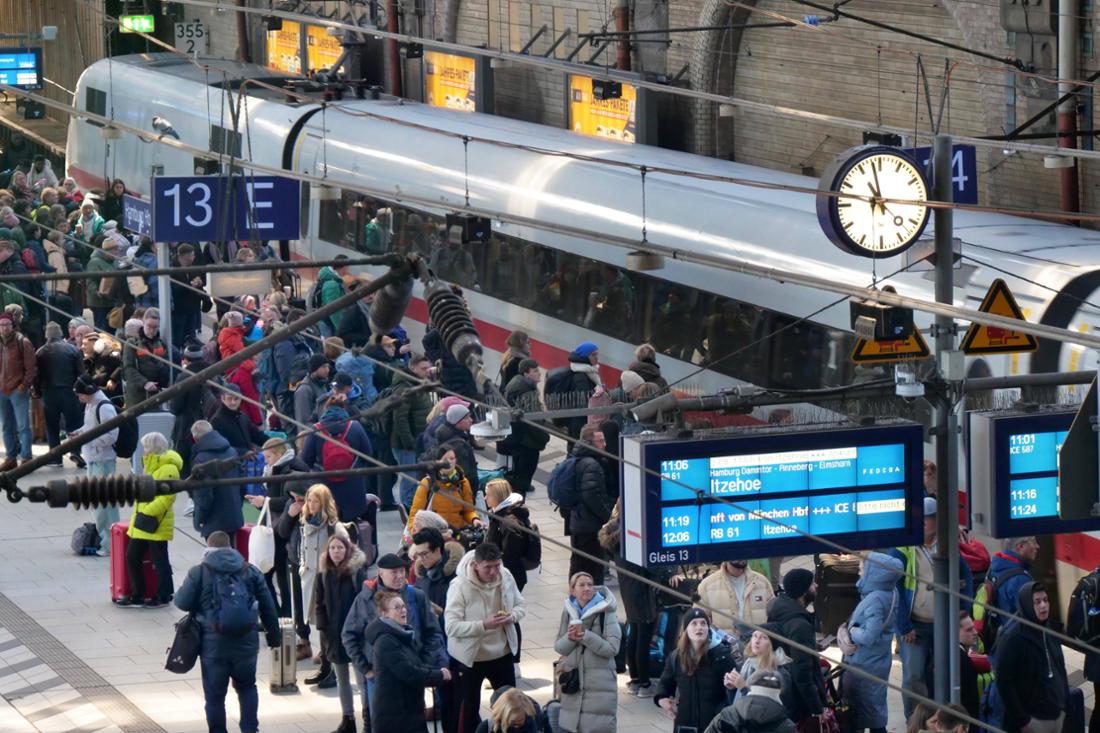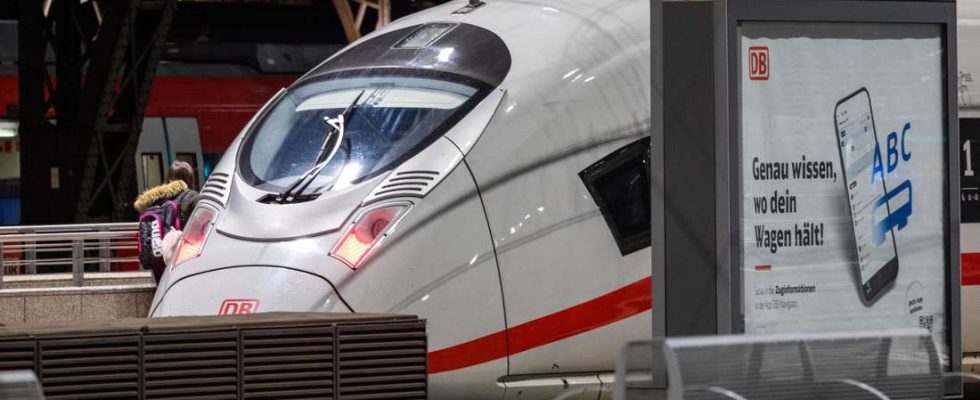Strikes are set to take place at the railway starting next week. Meanwhile, DB wants to present a new offer that could avert this.
- Strikes in January: The GDL is taking a Christmas break until January 7th.
- Chaos possible from January 8th: The train drivers want to strike for up to five days in a row
- Bahn sues: The DB is checking whether the GDL is right with its strikes
Update from January 5th, 4:08 p.m.: After the railway made a new offer to the GDL, a union spokesman confirmed that it would now be examined. No further details or information about a possible strike were given. The Christmas truce declared by the GDL ends on Monday. However, according to the chairman of the German Civil Service Association (dbb), there will be a strike on Wednesday (January 10th) at the earliest. The reason is the annual meeting of the dbb, of which the GDL is a member. He had agreed with GDL boss Claus Weselsky “that no strikes will take place during the conference in Cologne,” said dbb boss Ulrich Silberbach Cologne City Gazette. “Arrival and departure are guaranteed. What happens after that is no longer in my hands.”
Deutsche Bahn presents a new offer and wants to negotiate again on Wednesday
Update from January 5th, 2:07 p.m.: According to its own information, Deutsche Bahn has submitted its new offer to the GDL union. Now she wants to talk about new trial dates and suggests January 10th. In this context, the question of the GDL’s ability to negotiate tariffs also needs to be clarified. The company currently assumes that the GDL has lost its ability to negotiate collective agreements due to the establishment of its temporary worker cooperative Fair Train. This comes about, among other things, through personal and organizational connections in the management positions of GDL and Fair Train. By founding its temporary worker cooperative, the union was also an employer and had essentially negotiated and concluded a collective agreement with itself.
Update from January 5th, 12:22 p.m.: Deutsche Bahn wants to possibly avert a strike with a new offer to the union. Human resources director Martin Seiler said in an interview with South German newspaper said that they now want to “go a long way towards meeting the GDL’s core demands”. “We now want to negotiate additional choice models for shift workers. They could then only work 35 hours instead of 38 – or even 40 hours. Everyone chooses, like in a cafeteria,” says Seiler. They also want to offer shift workers more options when it comes to timings.
However, Seiler also said that there could be no full compensation for reduced working hours. “If additional costs arise due to shorter working hours, there have to be compromises in the wage increase.” But they want to talk to the union about what is possible. In return, the GDL should stop the strikes for now. “There’s really no reason for that anymore.”
Rail strike possible from Monday – no new details known
Update from January 5th, 11:34 a.m.: The Pro Bahn passenger association has criticized the demands of the GDL union. In an interview with NDR, Pro Bahn chairman Malte Diehl said that a reduction in train drivers’ working hours was unacceptable. “Then more trains will be canceled.” Deutsche Bahn has submitted an offer, but the GDL would rather win a competition with the EVG union, Diehl continued.

Update from January 5th, 9:20 a.m.: There is still nothing new known about the exact date of the train drivers’ strike. The only thing that is certain so far is that the winter break will end on Monday and strikes will be possible at any time from then on. The GDL has promised to announce the strike at least two days in advance. It is therefore unlikely that the strike will begin on Monday.
What also speaks against a strike on January 5th is the announced farmers’ protest across the country. The focus should then initially be on the farmers who want to start a week of action on Monday. However, this will only culminate on January 15th in Berlin – if both actions take place at the same time, there is a risk of absolute traffic chaos.
First report from January 2nd:
Munich – In the new year of 2024, a violent wage dispute will continue to rage between the railway and the train drivers’ union GDL. The train drivers are threatening new strikes from January 8th. Until then, the union has announced a Christmas truce. The GDL wants to announce any longer industrial disputes at least 48 hours in advance.
But the union is “aware of its responsibility,” said the GDL chairman of the train drivers’ union, Claus Weselsky. The strike vote makes unlimited strikes legally possible. However: “We have never initiated indefinite strikes,” said Weselsky on Deutschlandfunk. When asked whether he could rule them out in the current round, he said “of course”. There is also a threat of strikes at airports in Germany.
GDL rail strike in January: Union does not want to strike for more than five days at a time
The GDL does not want to strike for more than five days at a time. “We will go on strikes lasting three to a maximum of five days,” said Weselsky Rhenish Post with regard to the GDL’s threatened rail strikes in January 2024. “Declaring an indefinite strike would not be okay in view of customers and the economic consequences.”
However, a new court case could massively change the conditions in the conflict. Like the newspaper Picture reports, the railway is suing the GDL. The fundamental question is whether the GDL train drivers are allowed to strike in the current way, negotiate or conclude a collective agreement.
Traveling by train: vote
GDL rail strikes in January: DB sues train drivers’ union
The train drivers from the GDL union should quit their railway jobs and then work again as “loan drivers” via “Fair Train” for the state-owned company. Whether this is legal will be clarified before the Hessian State Labor Court after a declaratory judgment action has been filed.
According to the research, “Fair Train” and the GDL have, so to speak, concluded a collective agreement with themselves because they act as an employer and a union, which means they lose their ability to collectively bargain. There are also said to be serious conflicts of interest. This would probably have a major impact on future strikes following a verdict, but not on the GDL’s currently threatened rail strike.
GDL rail strike: Negotiations about fewer working hours and wage increases have so far failed
The GDL and Deutsche Bahn have been negotiating new collective agreements since the beginning of November. The chairman of the train drivers’ union, Claus Weselsky, declared the negotiations to have failed after the second round. A central sticking point in the conflict is the reduction in weekly working hours for shift workers with full pay, as demanded by the GDL.
The union wants to achieve a reduction from 38 to 35 hours. However, the railway considers this to be unachievable given, among other things, the shortage of skilled workers. The GDL has already tried to increase the pressure on the railways with two warning strikes. So far, the railway has stuck to its stance on the issue of working hours. At DB competitor Netinera (including Metronom, ODEG, Vlexx), the GDL is further with its demands: the gradual introduction of the 35-hour week will begin there at the beginning of 2025. (cgsc with dpa)

